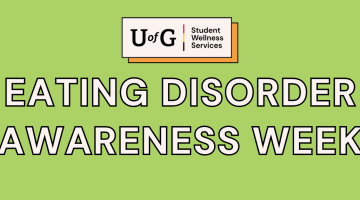Eating Disorder Resources
Prepared by Student Wellness Student Volunteers for 2022 Eating Disorder Awareness Week
Eating Disorders affect people of all genders, sexual orientations, ages, socioeconomic class, abilities, races, and ethnic backgrounds. If you are a University of Guelph student and are concerned about eating disorders or disordered eating, Student Wellness Services can help. Contact us at 519-824-4120 x52131 to book a free appointment with our Dietitian or Counselling Services.
You can also reach out to the National Eating Disorders Information Centre (NEDIC) and access their Helpline and online chat 7 days a week. Hours vary, so go to nedic.ca/contact for more information.
Eating Disorder Topics Included:
- Challenges for Men with Eating Disorders
- Binge Eating Disorder
- Debunking Myths About Eating Disorders
- Eating Disorders in the 2SLGBTQIA+ Community
Challenges for Men with Eating Disorders
What is the Challenge?
Male identifying folks account for one-quarter of all eating disorder cases such as anorexia nervosa and bulimia
- Treatment for male-identifying people has come a long way but many of their needs largely go unaddressed in what remains a female-centric realm
- Much of the treatment and even diagnosing is geared towards female-identifying people
Why Have Eating Disorders in Males Not Received Attention Until Recently?
- The omission of male-identifying folks from research on eating disorders
- Lack of recognition of eating disorder symptoms by male-identifying people and their family members
- Bias by professionals leads to less of a likelihood of eating disorder diagnosis in males
- Exclusion of male-identifying folk by eating disorder treatment centres
- There is a strong feminine branding of eating disorder treatment centers:
- Feminine dominated decor
- No male images on websites and marketing materials
- Eating disorders present with different symptoms in males than in females
- Inadequate attention to male-identifying people's eating disorder behaviours in most eating disorder assessment measures
Why Are Traditional Treatment Programs Poorly Suited For Men?
- Therapy often takes place in a group setting, where female-identifying people typically outnumber men by a wide margin
- Male identifying people are often encouraged to hide their true feelings, so it may be difficult for them to reflect upon their emotional well-being in a female-dominated setting
"Males are taught to repress their feelings to the point where they have difficulty even identifying what they are feeling.” - Merryl Bear, Director of the National Eating Disorder Information Centre, a nonprofit organization based in Toronto, Ontario.
Why Are Traditional Treatment Programs Poorly Suited For Men?
- identifying people could lead to discussing subjects foreign to male-identifying folks
- For example, focusing on subjects such as missed menstrual periods and distorted body images attributed to models in fashion magazines
- Clinicians in charge likely have little experience with male-identifying patients
- Some male-identifying people in treatment have suggested that they have felt more like intruders than confidants in group sessions with females
Treatment Considerations for Men With Eating Disorders
- Treatment is not one-size-fits-all. For any person, biological and cultural factors should be taken into consideration in order to provide an effective treatment environment
- A gender-sensitive approach with recognition of different needs and dynamics for male-identifying people is critical ineffective treatment
- Male identifying people in treatment can feel out of place when predominately surrounded by female-identifying people, and an all-male treatment environment is recommended when possible
Learn More About How To Support a Male Identifying Person Who is Struggling:
- The National Eating Disorders Information Centre - nedic.ca
- Waterloo-Wellington Eating Disorders Coalition - www.eatingdisorderscoalition.ca
- Very Well Mind - verywellmind.com/male-eating-disorders-4140606
- Treatment Challenges For Men With Eating Disorders - www.ncbi.nlm.nih.gov/pmc/articles/PMC3576452/
Binge Eating Disorder
What is Binge Eating Disorder?
- Binge eating disorder is characterized by recurring episodes of eating large quantities of food in a short period of time.
- One usually feels out of control throughout a binge eating episode and may continue to eat until they feel uncomfortably full.
- These episodes are commonly followed by feelings of guilt or shame.
Common Warning Signs of Binge Eating Disorder include:
- Changes in body weight
- Wearing clothes that hide body shape and having extreme concern with body weight/shape
- Feeling the need to hide food choices from others or feeling the need to eat in secret
- Feeling guilt/anxiety surrounding eating or food
- Feeling uncomfortable eating around others
- Withdrawing from usual activities and friends
Myths & Facts about Binge Eating Disorder:
MYTH: Binge eating is the same as overeating
FACT: Overeating refers to eating more than the body needs at a given time. Binge eating is characterized by psychological distress.
MYTH: Binge eating disorder is rare
FACT: Binge eating disorder affects more people than any other eating disorder.
MYTH: Binge Eating Disorder is not dangerous like other eating disorders
FACT: Binge Eating Disorder can have serious health implications and requires treatment just like any eating disorder.
MYTH: Binge Eating Disorder only affects people who are overweight
FACT: Binge Eating Disorder affects people of all body types.
Did you Know?
Only slightly over 40% of people with Binge Eating Disorder will receive treatment at some point in their life.
- Although BED is formally recognized as a psychological disorder, many people with this condition fear reaching out for help due to it being heavily stigmatized.
- It is a common misconception that people with binge eating disorder simply lack self control, however this is completely false. Binge eating disorder occurs due to many complex factors.
Learn More About Binge Eating Disorder:
The Eating Recovery Centre - eatingrecoverycenter.com/resources/eating-disorder-facts-myths
The National Eating Disorders Collaborations - nedc.com.au/eating-disorders/eating-disorders-explained/myth/
Waterloo-Wellington Eating Disorders Coalition - eatingdisorderscoalition.ca
Debunking Myths About Eating Disorders
Myth: Eating Disorders Are A Choice
Truth: An eating disorder is a serious medical and psychiatric illness that an individual does not choose to endure. It is a bio-psycho-social disease which means that it is caused by genetic, biological, environmental, and social factors.
Myth: Eating Disorders Are A "Girl Thing"
Truth: Eating disorders may develop in anyone, regardless of gender. In fact, in 2007, the research found that up to 1/3 of all eating disorder patients were males. Today, clinicians are observing a growing number of patients with eating disorders that identify as male or non-binary.
Myth: Eating Disorders Are Just About Food
Truth: Eating disorders usually involve an obsession with calories, weight, or shape, but these illnesses can extend far beyond food. Eating disorders often co-occur with perfectionism and obsessionality.
Myth: Only Very Thin Individuals Have An Eating Disorder
Truth: Although restrictive eating disorders (e.g. anorexia nervosa) may lead to weight loss, many patients are normal-weighted. This misconception is dangerous because it can contribute to a misdiagnosis or even a delayed diagnosis.
Myth: Eating Disorders Are Not a Big Deal
Truth: Eating disorders are real and serious mental illnesses. Each disorder has its own classification in the Diagnostic and Statistical Manual. Moreover, eating disorders can be deadly. For instance, individuals with anorexia nervosa are 12 times more likely to die from the disorder itself than any other cause of death.
Myth: Recovery From Eating Disorders Is Rare
Truth: Recovery is completely possible. Recovery can take months or years due to the complexity of the illness but with treatment, people do recover.
Eating Disorders in the 2SLGBTQIA+ Community
Folks in this community are disproportionately experiencing eating disorders. 2SLGBTQIA+ adults and adolescents are more likely to experience eating disorders and disordered eating behaviours in comparison to their cisgender and heterosexual counterparts.
Factors That May Lead to Developing an Eating Disorder:
- Fear or experience of rejection
- Internalized negative beliefs about oneself due to expression or identity
- Body image ideals within some 2SLGBTQIA+ cultural contexts
- Experiences of violence & post-traumatic stress disorder
- Discrimination or being a victim of bullying due to sexual orientation & /or gender identity
- Discordance between one’s biological sex and gender identity
Risk Factors:
- Gay community involvement
- Gender role orientation
- Social comparison
- Sexual objectification experiences
- Internalized biphobia
- Antibisexual discrimination
Gay Men and Eating Disorders:
- Gay men are more likely to have fasted, vomited, taken laxatives or diet pills to control their weight in the last 30 days
- Thought to only represent 5% of the total male population but among males who have eating disorders, 42% identify as gay
- 7 times more likely to report binging & 12 times more likely to report purging than heterosexual males.
Lesbian Women and Eating Disorders:
- Adult lesbians have more frequent clinical diagnoses of binge eating disorders than heterosexual women.
- Binge eating occurs at a higher rate than any other sexual orientation group
- Weight dissatisfaction exhibited greater body dissatisfaction than heterosexual women
Bisexual Folks and Eating Disorders:
Greater frequency of fasting, purging, diet pill usage, laxative usage, skipping meals, body dissatisfaction
Transgender Folks and Eating Disorders:
Reports of high incidences of fasting more than 24hours, laxative usage, diet pill usage, steroid usage without prescription, dietary restraint, bingeing, purging, and general disordered eating behaviours compared to cisgender peers.
How Can Eating Disorders Affect Sexual Health?
- Loss of libido & complications with testosterone production
- Physiological impairment of the functioning of sex organs
- Body dissatisfaction and distorted body image can inhibit unhealthy sexual functioning
- Can display more negative attitudes toward sex, increased sexual anxiety, and less sexual satisfaction
Interested in Learning More?
RSVP on Gryphlife for our upcoming Faces of Recovery event on February 9, 7-8:30 PM HERE
Resources:
- The Eating Recovery Centre - eatingrecoverycenter.com/resources/eating-disorder-facts-myths
- The National Eating Disorders Collaborations - nedc.com.au/eating-disorders/eating-disorders-explained/myth/
- Waterloo-Wellington Eating Disorders Coalition - eatingdisorderscoalition.ca




